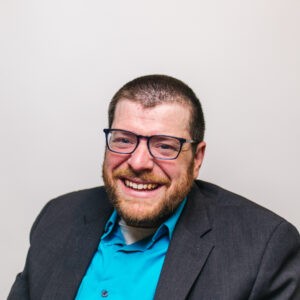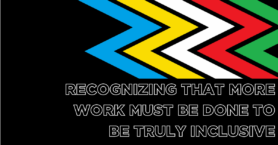Disability Pride: Recognizing That More Work Must Be Done To Be Truly Inclusive
- By: National Network of Public Health Institutes and Anthony Oberg
- Date
Disability has never been a source of pride for me in how people typically use “pride.” Cerebral Palsy has been a constant; in other words, it is a condition that differentiates me from many of my family, friends, and peers. For much of my personal life, I did not embrace it as part of my identity; it just was. As I entered the public health workforce, however, I learned that my lived experience with disability influences how I contribute to public health work.
July was Disability Pride Month, and I reflected on how my relationship with Cerebral Palsy has changed. I want to use my personal and professional experience to raise awareness about how people with disabilities interact in a society not always built with them in mind. The US has a history of discrimination against people with disabilities which ultimately prompted the advocacy that led to the passage of the Americans with Disabilities Act (ADA). However, it is essential to note that the ADA is a floor, not a ceiling – discrimination still happens in many areas, including employment, education, access to services, and public spaces. Working at the National Network of Public Health Institutes (NNPHI) has allowed me to use my experience in a way that supports my passion for integrating disability into all work.
Public health is a broad field. There are many areas of public health and types of careers to specialize in, including environmental health, community health, epidemiology, global health, and health policy and management. In grad school at American University, no one precisely explained what public health was. I never intended to work in public health. I fell into it by learning digital accessibility as a federal consultant and then working at a disability non-profit.
“Section 508 of the Rehabilitation Act of 1973 aims to ensure that people with disabilities have the same or comparable access to information as to which all citizens are entitled.” Gaining the technical 508 skills and more experience in disability advocacy made me realize that disability is one of the most cross-cutting human conditions. Everyone has or will experience disability in some fashion, even if just through the aging process. If my thoughts on the subject help even one person, it is a positive step toward inclusion.
Society often thinks of people with disabilities as a single population, but it’s a diverse group with a wide range of needs. That’s where I see the most potential to use my knowledge and experience to enhance the projects I am involved in; accessibility is improved through many types of technology, standards, and guidelines. I try to use the skills I’ve learned to improve how NNPHI presents its work.
NNPHI’s commitment to inclusive practices is one of the things I have found most refreshing since I joined the team in December of 2021. We are always open to learning and exploring new ways to engage our audiences. Our work is only effective if it reaches the folks that want to engage with us.
As a wheelchair user, I can’t participate in any activity without a certain level of accommodation. The same can be said of others with different needs, so our work in public health must keep all modes of participation in mind. Things like (CART) services, American Sign Language (ASL) interpreters, screen reader accessible information, and the willingness to ask for and deliver on accommodations are all aspects I value as a professional and a person with a disability.
To me, disability pride is embracing different ways of functioning and recognizing that more work must be done to be truly inclusive. I believe “many people with a disability may find it hard to feel pride when it seems like our experiences are financial insecurity, fear of physical danger or abuse, and isolation and discrimination.” All disabilities and their intersecting identities should be acknowledged, valued, and respected, not only during Disability Pride Month but every month.
I am proud of my work at NNPHI and am glad to use my lived experience to contribute to inclusive practices. As I reflect on the 33rd anniversary of the ADA and Disability Pride Month in general, I am energized to continue working alongside NNPHI colleagues to integrate disability into our activities and in our communities.
About Our Author
 Anthony Oberg, MPA, is a Program Manager on the Bridging Sectors to Create Health Portfolio at the National Network of Public Health Institutes (NNPHI). He received his master’s degree in Public Administration from American University in 2015. As a person with a disability, his lived experience with Cerebral Palsy has influenced his professional life and approach to public health work.
Anthony Oberg, MPA, is a Program Manager on the Bridging Sectors to Create Health Portfolio at the National Network of Public Health Institutes (NNPHI). He received his master’s degree in Public Administration from American University in 2015. As a person with a disability, his lived experience with Cerebral Palsy has influenced his professional life and approach to public health work.
Prior to working at NNPHI, Anthony worked for a federal contractor in VA, where learned the importance of document accessibility and making sure information can reach as many audiences as possible. Using his lived experience alongside his project coordination expertise Anthony hopes to increase awareness of disability in the public health space.

 Subscribe To Our Communications
Subscribe To Our Communications